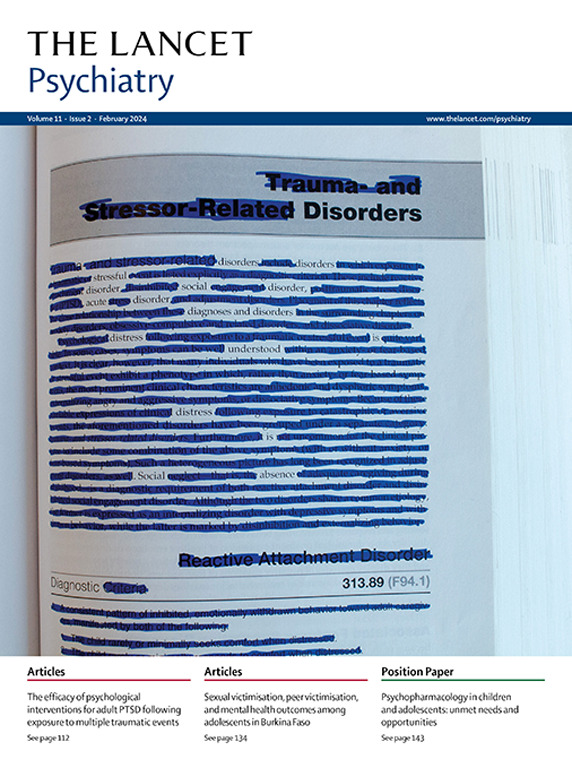迎接精神病学的复杂性--从还原论到系统方法
IF 30.8
1区 医学
Q1 PSYCHIATRY
引用次数: 0
摘要
精神疾病具有多面性,包括生物、心理、社会和环境因素之间的动态互动,因此对这些疾病的理解和治疗面临着独特的挑战。传统的还原论方法往往将这些病症简化为线性因果关系,忽略了精神疾病固有的复杂性和相互关联性。复杂系统方法的进步为捕捉和量化精神障碍的非线性和突发特性提供了一个全面的框架。这种 "个人观点 "强调了确定大脑和行为随时间变化的生成模型规则的重要性,这可能有助于对精神疾病进行个性化评估和干预。例如,双相情感障碍的情绪波动可以通过动态系统建模来理解,这种建模可以确定可改变的参数,如昼夜节律紊乱,可以通过光疗等针对性疗法来解决。同样,认识到抑郁症是由复杂的相互作用引起的一种突发性疾病,就需要采取综合治疗策略,以增强个体的适应性反应。量化多层次相互作用和网络动态的框架有助于研究人员和临床医生了解神经回路、行为和社会环境之间的相互作用。概率模型和自组织概念有助于建立精神障碍的具体动力系统模型,便于早期识别风险状态,并通过适时提供适应性干预来提高复原力。在精神病学中采用这些复杂系统方法可以捕捉到精神障碍的真正本质,即它是一个动态复杂系统的属性,而不是任何病变或损伤的表现。这种思路可能会改善诊断和治疗,为精神疾病患者带来新的希望,并为更有效、更个性化的精神健康护理铺平道路。本文章由计算机程序翻译,如有差异,请以英文原文为准。
Embracing complexity in psychiatry—from reductionistic to systems approaches
The understanding and treatment of psychiatric disorders present unique challenges due to these conditions' multifaceted nature, comprising dynamic interactions between biological, psychological, social, and environmental factors. Traditional reductionistic approaches often simplify these conditions into linear cause-and-effect relationships, overlooking the complexity and interconnectedness inherent in psychiatric disorders. Advances in complex systems approaches provide a comprehensive framework to capture and quantify the non-linear and emergent properties of psychiatric disorders. This Personal View emphasises the importance of identifying rules for generative models that govern brain and behaviour over time, which might contribute to personalised assessments and interventions for psychiatric disorders. For instance, mood fluctuations in bipolar disorder can be understood through dynamical systems modelling, which identifies modifiable parameters, such as circadian disruption, that can be addressed through targeted therapies such as light therapy. Similarly, recognition of depression as an emergent property arising from complex interactions highlights the need for integrated treatment strategies that enhance adaptive reactions in the individual. A framework for quantifying multilevel interactions and network dynamics can help researchers and clinicians to understand the interplay between neural circuits, behaviours, and social contexts. Probabilistic models and self-organisation concepts contribute to building concrete dynamical systems models of mental disorders, facilitating early identification of risk states and promoting resilience through adaptive interventions delivered with optimal timing. Embracing these complex systems approaches in psychiatry could capture the true nature of psychiatric disorders as properties of a dynamic complex system and not the manifestation of any lesion or insult. This line of thinking might improve diagnosis and treatment, offering new hope for individuals affected by psychiatric conditions and paving the way for more effective, personalised mental health care.
求助全文
通过发布文献求助,成功后即可免费获取论文全文。
去求助
来源期刊

Lancet Psychiatry
PSYCHIATRY-
CiteScore
58.30
自引率
0.90%
发文量
0
期刊介绍:
The Lancet Psychiatry is a globally renowned and trusted resource for groundbreaking research in the field of psychiatry. We specialize in publishing original studies that contribute to transforming and shedding light on important aspects of psychiatric practice. Our comprehensive coverage extends to diverse topics including psychopharmacology, psychotherapy, and psychosocial approaches that address psychiatric disorders throughout the lifespan. We aim to channel innovative treatments and examine the biological research that forms the foundation of such advancements. Our journal also explores novel service delivery methods and promotes fresh perspectives on mental illness, emphasizing the significant contributions of social psychiatry.
 求助内容:
求助内容: 应助结果提醒方式:
应助结果提醒方式:


